RightsCon 2025 Call for Proposals: The numbers, the trends, and what’s next!
August 8, 2024 • Program • 11 min read

Senior Program Coordinator
As the digital rights landscape evolves, the RightsCon Call for Proposals adapts in step, mirroring current trends and transformations to weave a dynamic overview of the state of human rights in the digital age. In the lead up to our second hybrid summit and an anticipated return to the Asia Pacific region after a decade, we’re sharing the figures behind the Call for Proposals and a preview of the themes shaping the agenda for RightsCon 2025 (Taipei and online, February 24-27).
Number of session proposals per year
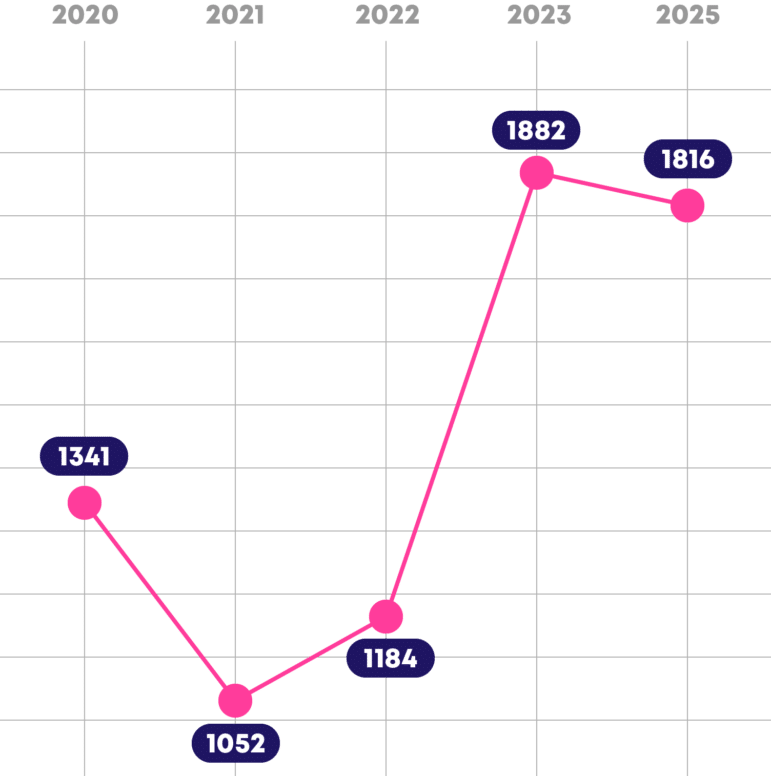
Number of host institutions per year
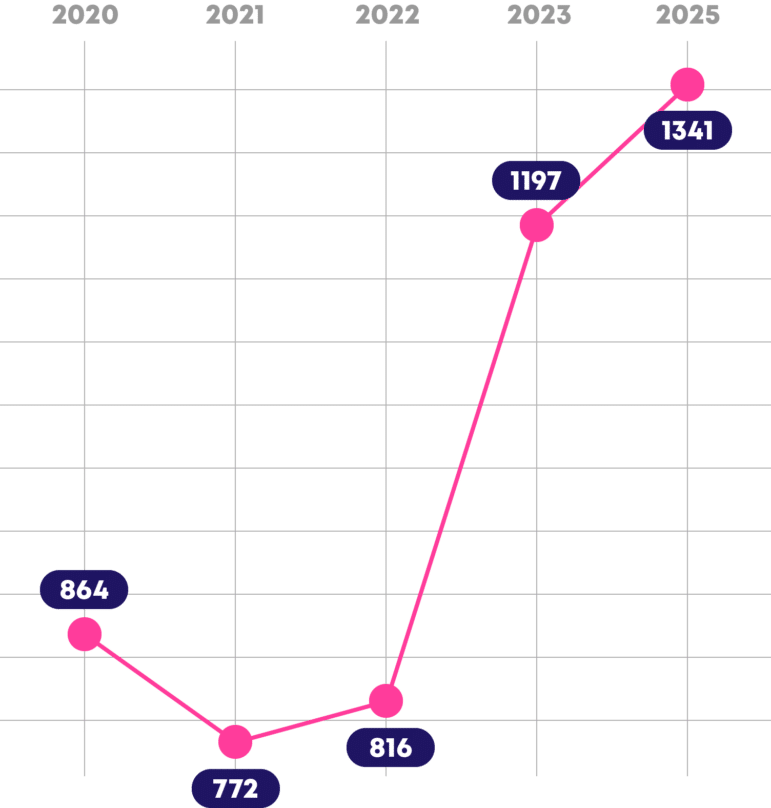
Number of countries per year
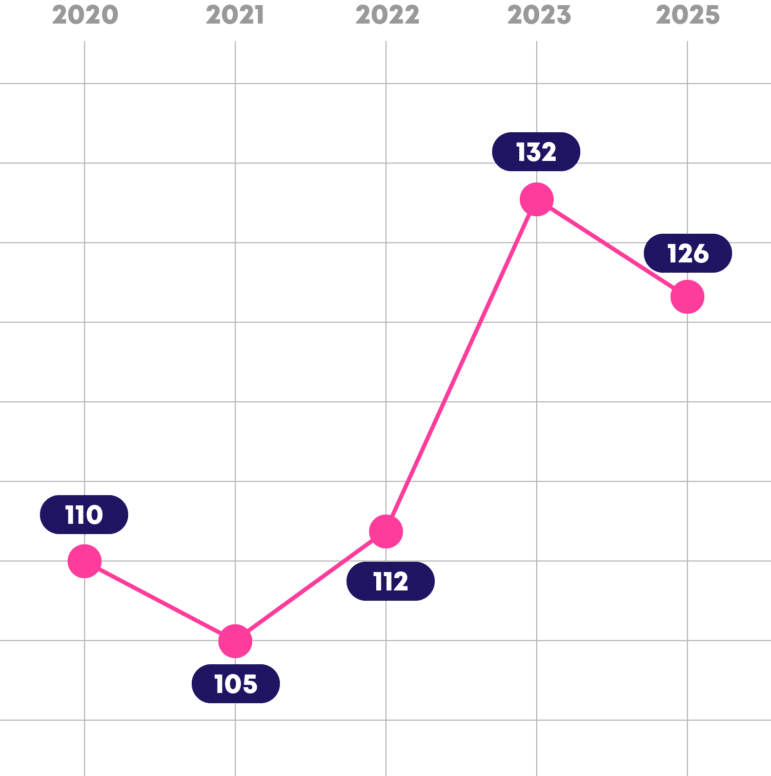
For the second year in a row, we received over 1,800 session ideas from activists, technologists, creatives, journalists, business leaders, philanthropists, policymakers, and more, spanning 126 countries across the globe. The variety of perspectives represented underscores the urgency of our collective work and the importance of holding spaces where stakeholders across regions and sectors can come together to advance the agenda for a just and sustainable digital future.
Community demographics
The RightsCon community continues to grow and expand beyond physical and digital borders: two-thirds of proposers are returning members of our network and experienced session organizers, while 40 percent are new to our summit. It’s inspiring to see so many participants return year after year and equally as exciting to usher in an influx of new voices, eager to collaborate, strategize, and push forward our shared agenda.
Last year, we reported reaching an important milestone in our efforts to foster equitable representation in our program, as half of our session proposers came from countries in the Global Majority. We’re pleased to see this trend continue, with 53 percent of proposers this year, identifying as members of the Global Majority. Additionally, the legacy of our summit as a women-led, gender-diverse space, holds fast with more than half of session proposers identifying as women, and 5 percent identifying as nonbinary, bigender, agender, or genderfluid.
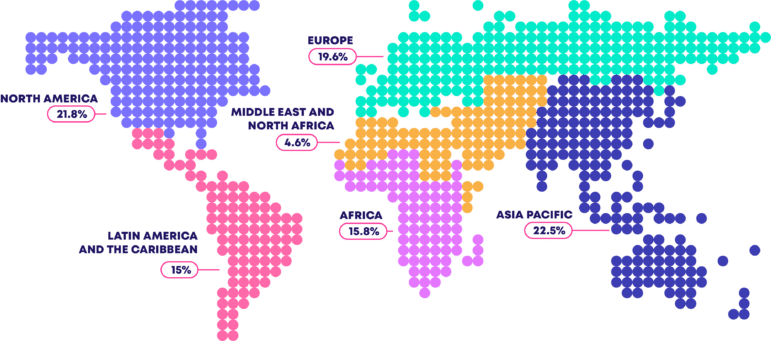
Fittingly, representation from the Asia Pacific region ticked up, with nearly a 50 percent increase in proposals from 2023. This surge accounts for nearly a quarter of all submitted proposals, with 22.5 percent of session proposers identifying with a country in this region, marking it as the highest in terms of proposer representation. While we noted slight decreases in submissions from North America, Europe, and Latin America, that decline corresponded with an uptick in the number of proposers from Africa, our host region for RightsCon 2026. We also see continued linguistic diversification of the program with the introduction of sessions proposed in more languages including Mandarin, Korean, and Bengali.

The themes and trends for RightsCon 2025
Halfway through the biggest global election year in history, a pivotal year for democracy, elections and information integrity emerged as a prominent theme in the Call for Proposals. This focus is particularly pertinent in our host region – home to the highest number of elections in 2024 compared to other world regions – with voters in India, Indonesia, Sri Lanka, Pakistan, Bangladesh, and Taiwan heading to the polls over the course of the year. Session proposers share observations from recent elections, highlighting trends such as disinformation campaigns and foreign influence operations. Proposals also explore the opportunities and risks of AI in enhancing civic engagement and powering electoral processes, while scrutinizing the role and responsibilities of digital platforms in combating information manipulation.
With the rapid advancement of generative AI cutting across multiple aspects of our daily lives, the Call for Proposals was marked by a high volume of proposals focused on governance of the technology and regulation of its development and deployment. Submitted proposals examine domestic, regional, and international evolutions in regulatory frameworks, and the balancing act between safety and innovation. In the same vein, session proposers are highlighting the need for standardization of rights-based AI boundaries, best practices, and codes of conduct across regions.
In the midst of the “new space race”, we see a surge of discussions on space data and technologies seeking to dissect the potential of satellite data and space capabilities for ecological systems and industries earth side. Going further, others examine the role of satellite communications in information sharing and connectivity and consider the corresponding threats posed to internet freedoms and democratic processes.
As conflicts and militarization escalate globally, session proposers are narrowing in on the proliferation of automated weapon systems and the dangers of digital dehumanization. We see renewed interrogation of the use of technologies in humanitarian settings, with proposals exploring methods to mitigate the risks of data and privacy breaches that further expose vulnerable populations to surveillance, discrimination, and persecution. Proposers are also seeking to lay bare the severe human rights impacts of internet shutdowns in Gaza, Myanmar, Kashmir, and Sudan, the weaponization of AI for state and non-state propaganda, efforts to document Russian attacks against healthcare systems in Ukraine, and the role of social media platforms in facilitating cyber surveillance, digital oppression and wartime censorship. Sessions will focus on solutions, practical strategies, and innovative communication methods that communities can adopt, offering practical insights and lessons learned from the ground.
Over the past couple of years, regulatory benchmarks such as the EU Digital Services Act and the Online Safety Acts in the United Kingdom and Australia have come into force, introducing safeguards such as online age verification mandates to prevent minors from accessing “harmful” or “adult” content. However, the implications for privacy, access to information, and freedom of expression are still being discovered and debated. Policymakers, activists, and technologists will come together at RightsCon to dissect the intersection between child safety, age-gating, and the potential pitfalls of online identity verification technology.
More than ever, our community is questioning the true impact of synthetic content on the information ecosystem. While we see proposals outlining the unique challenges of moderating synthetic media and calling out its role in the spread of misinformation and malicious content against women and LGBTQI+ activists, others are championing automated hash-matching and predictive machine learning tools for platform governance at scale. Also prominent within the Content Governance category, session proposers seek to expose the regulation of platforms connected to authoritarian regimes, discuss the effects of censorial bans, and map out alternative approaches to tackle authoritarian influence across social media.
Explore this year in numbers

Proposals by program categories
| Program categories | 2025 | 2023 | 2022 | 2021 | 2020 | 2019 |
|---|---|---|---|---|---|---|
| Artificial Intelligence and Emerging Technologies | 91 | 76 | 72 | 66 | 107 | 59 |
| Business and Human Rights | 121 | 109 | 53 | 73 | 87 | 50 |
| Conflict and Humanitarian Action | 68 | 95 | 33 | 22 | 97 | – |
| Content Governance | 112 | 129 | 99 | 101 | 119 | 90 |
| Data Protection | 86 | 124 | 90 | 82 | 75 | 46 |
| Digital Security for Communities | 117 | 136 | 82 | 44 | – | 64 |
| Freedom of the Media | 96 | 95 | 63 | 47 | 66 | 86 |
| Freedoms and Agency in the Age of Surveillance | 101 | 92 | 89 | 68 | 84 | 87 |
| Futures, Fictions, and Creativity | 83 | 51 | 27 | 30 | 49 | – |
| Global Cyber Norms and Encryption | 28 | 46 | 45 | 25 | 78 | 17 |
| Governance, Politics, and Elections | 143 | 134 | 86 | 90 | 84 | 55 |
| Human Rights-Centered Design | 115 | 80 | 44 | 58 | 78 | 33 |
| Internet Access and Inclusion | 104 | 122 | 76 | 74 | 101 | 59 |
| Internet Shutdowns and Disruptions | 72 | 86 | 60 | 37 | 53 | 39 |
| Justice, Litigation, and Documentation | 105 | 104 | 39 | 46 | 78 | 20 |
| Online Hate and Violence | 131 | 146 | 75 | 64 | – | 39 |
| Organizational Capacity and Funding | 69 | 54 | 35 | 28 | 40 | 23 |
| Tactics and Contexts for Activists | 172 | 152 | 116 | 88 | 92 | 36 |

Proposals by session formats
Once again Dialogues proved to be the most popular format for session proposers, leading the way with 660 proposals, followed by Roundtables and Workshops with 389 and 356 sessions respectively.
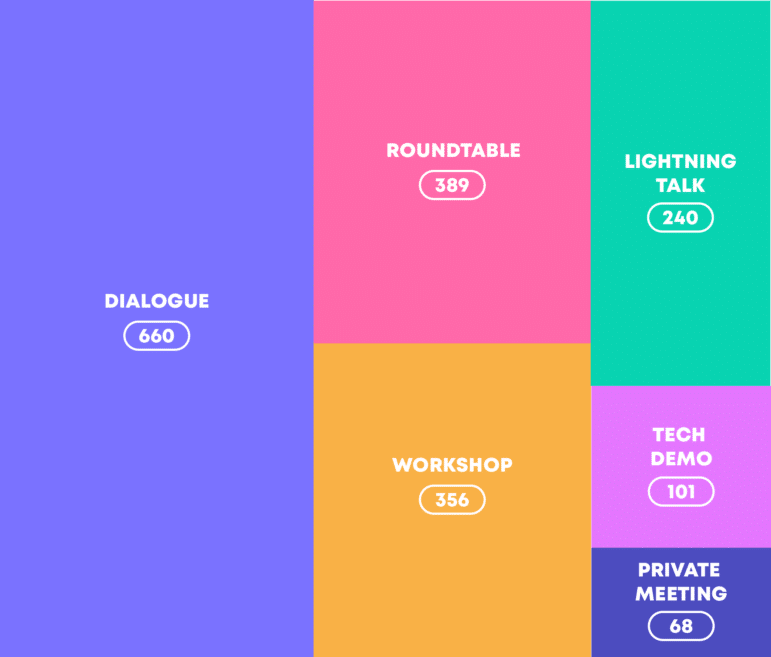

Proposals in languages other than English
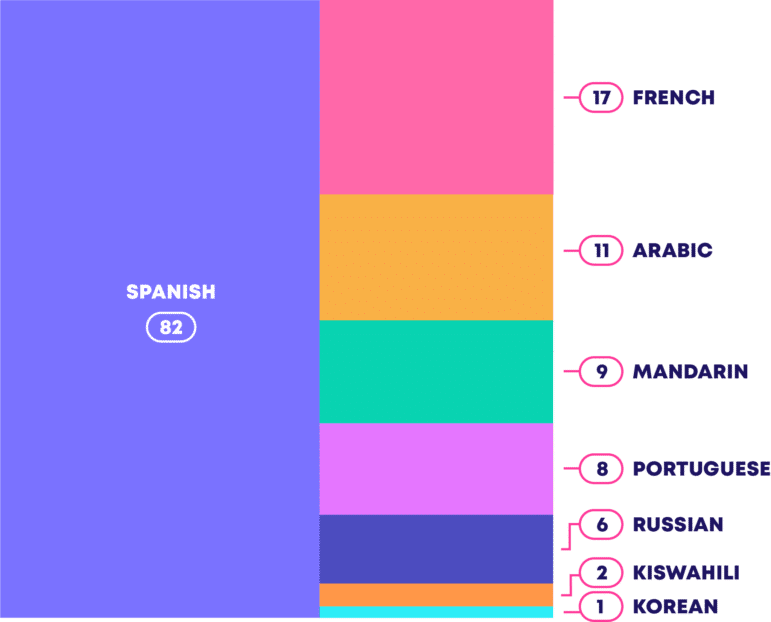

Coming up next
If you submitted a session proposal for RightsCon 2025, you will be notified about the final status of your proposal in late August. A special thank you to our Program Committee for dedicating their time and expertise to carefully review and recommend sessions for our program.
Missed the deadline to submit a proposal? Don’t worry, our Speaker & Facilitator List is still open until August 16! If you have a thematic or regional perspective at the intersection of human rights and technology, consider nominating yourself as a speaker or facilitator for a chance to contribute to an accepted session.
Reminder: registration for RightsCon 2025 opens on August 14! If your session is accepted into the program, you’ll receive a selection of discount codes (reserved for session organizers, speakers, and facilitators) which can be applied for both online and in-person ticket types. While you wait, check out our website for guidance to help you prepare for your visa application, flights, hotels, and more!
There’s much more in the works for our summit in Taipei and online. Stay tuned!




